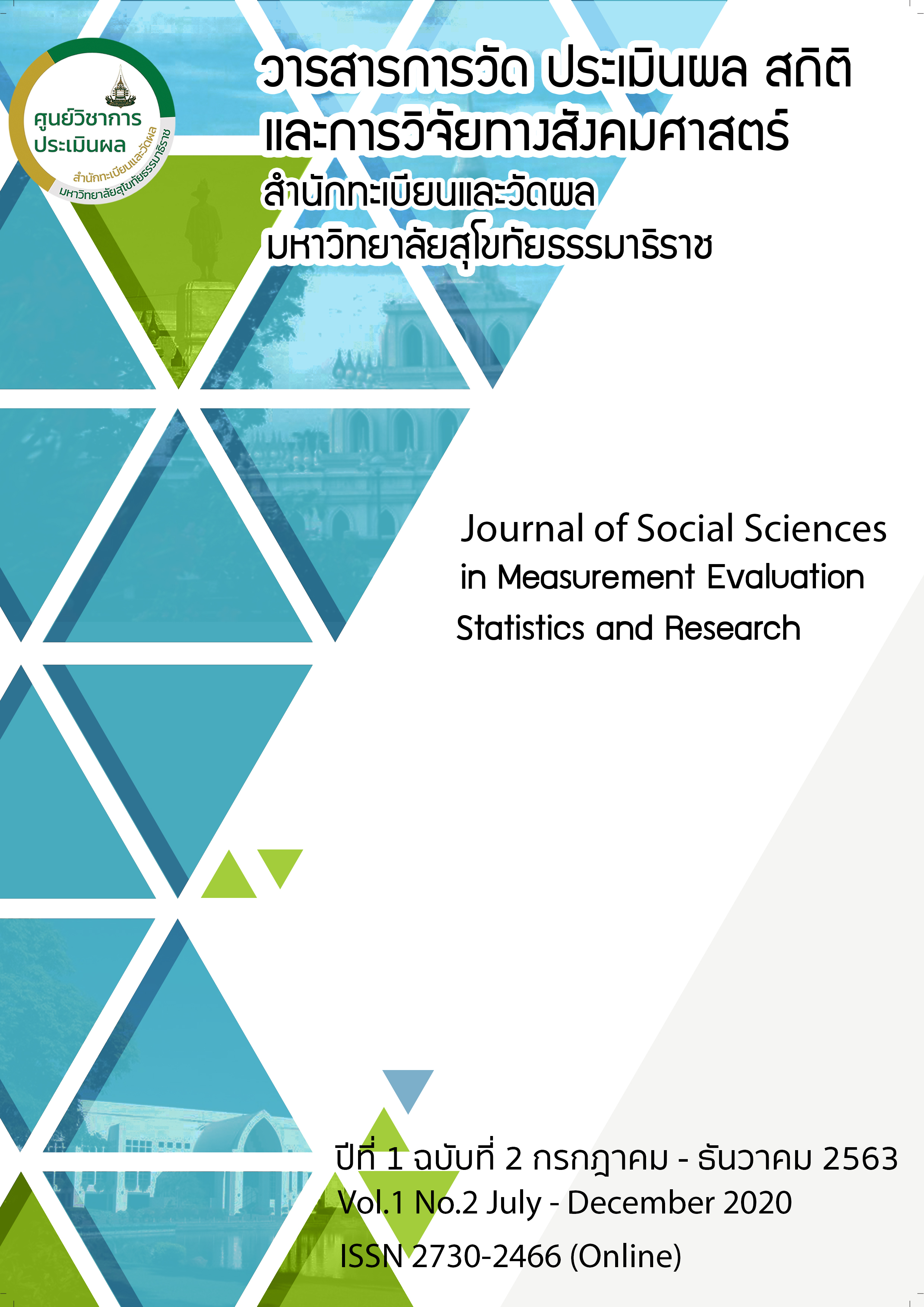Development of the Causal Model of Domain-Specific Satisfaction: An Application of the Social Cognitive Career Theory (SCCT)
Main Article Content
Abstract
There are many studies that have proposed models and theories that help in education and predict satisfaction in specific areas (such as job satisfaction). One of the theories that have been applied and covers the reasons for satisfying various aspects is the social cognitive career theory: SCCT. Therefore, in this research, the researcher applied the SCCT model to study, develop and examine causal models, factors related to specific aspects of satisfaction. Which the developed model consists of 3 latent variables, namely, specific satisfaction social support and resources And self-efficacy By analyzing from secondary data from the Learning Reform Evaluation Project of the Office of the National Education Commission, which collected data from teachers/professors in various educational institutions in Thailand in 2002, number 1,512 The results showed that the model was in harmony with the empirical data. The chi-square value was 24.520, df = 15, p = 0.057. The RMSEA value was 0.020. The RMR value was 0.003. To a 0.996, AGFI equal to 0.989 of its efficacies. And social support and resources have a direct influence on satisfaction in specific areas and social support and resources have an influence on be satisfied with specific aspects indirectly through self-efficacy.
Article Details

This work is licensed under a Creative Commons Attribution-NonCommercial-NoDerivatives 4.0 International License.
ข้อความและบทความในวารสารการวัด ประเมินผล สถิติ และการวิจัยทางสังคมศาสตร์ เป็นแนวคิดของผู้เขียน มิใช่ความคิดเห็นของกองบรรณาธิการวารสาร จึงมิใช่ความรับผิดชอบของวารสารการวัด ประเมินผล สถิติ และการวิจัยทางสังคมศาสตร์ บทความในวารสารต้องไม่เคยตีพิมพ์ที่ใดมาก่อน และสงวนสิทธิ์ตามกฎหมายไทย การจะนำไปเผยแพร่ ต้องได้รับอนุญาตเป็นลายลักษณ์อักษรจากกองบรรณาธิการ
References
บัณฑิตวิทยาลัย มหาวิทยาลัยเชียงใหม่.
ปรีดา เบ็ญคาร. (2548). การส่งเสริมการรับรู้ความสามารถของตนในกระบวนการพัฒนาการวิจัยปฏิบัติการในชั้นเรียนของครู. ปริญญานิพนธ์ดุษฎีบัณฑิต (วิจัยพฤติกรรมศาสตร์ประยุกต์). บัณฑิตวิทยาลัย มหาวิทยาลัยศรีนครินทรวิโรฒ.
นงลักษณ์ วิรัชชัย (2542). โมเดลลิสเรล: สถิติวิเคราะห์สำหรับการวิจัย (พิมพ์ครั้งที่ 3). กรุงเทพมหานคร : จุฬาลงกรณ์มหาวิทยาลัย.
Duffy, R. D., & Lent, R. W. (2009). Test of a social cognitive model of work satisfaction in teachers [Electronic version]. Journal of Vocational, 75, 212-223.
Lent, R. W., & Brown, S. D. (2006). Intergrating person and situation perspectives on work satisfaction: A social-cognitive view [Electronic version]. Journal of Vocational Behavior, 69, 236-247.
Lent, R. W., Nota, L., Soresi, S., Ginevra, M. C., Duffy, R. D., & Brown, S. D. (2011). Predicting the job and life satisfaction of Italian teachers: Test of a social cognitive model [Electronic version]. Journal of Vocational Behavior, 79, 91–97.
Lent, R. W., Singley, D., Sheu, H., Gainor, K., Brenner, B. R., Treistman, D., et al. (2005). Social cognitive predictors of domain and life satisfaction: Exploring the theoretical precursors of subjective well-being [Electronic version]. Journal of Counseling Psychology, 52, 429-442.
Lent, R. W., Singley, D., Sheu, H., Schmidt, J. A., & Schmidt, L. C. (2007). Relation of social–cognitive factors to academic satisfaction in engineering students [Electronic version]. Journal of Career Assessment, 15, 87–97.
Lent, R. W., Taveira, M., & Lobo, C. (2012). Two tests of the social cognitive model of well-being in Portuguese college students [Electronic version]. Journal of Vocational Behavior, 80, 362-371.
Lent, R. W., Taveira, M., Sheu, H., &Singley, D. (2009). Social cognitive predictors of academic adjustment and life satisfaction in Portuguese college students: A longitudinal analysis [Electronic version]. Journal of Vocational Behavior, 74, 190–198.


